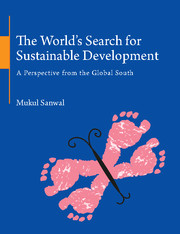Book contents
- Frontmatter
- Dedication
- Contents
- Preface
- Acknowledgments
- Abbreviations
- INTRODUCTION
- 1 Social Dimension of Sustainability
- CONSUMPTION IN AN UNEQUAL WORLD: FRAMING INTERNATIONAL COOPERATION
- CLIMATE POLICY: GLOBAL TO NATIONAL
- 6 Political Origins of Climate Policy
- 7 Questions on the Framework
- 8 Burden Shifting Rather than Burden Sharing
- 9 Development of a Shared Vision
- 10 The Middle Class and Global Ecological Limits
- 11 The New Climate Regime
- SUSTAINABLE DEVELOPMENT: NATIONAL TO GLOBAL
- CONSUMPTION IN A MORE EQUAL WORLD: SHAPING SOCIETAL FUNCTIONS
- GEOPOLITICS TO GEOECONOMICS: RURAL–URBAN DIVIDE, RATHER THAN BETWEEN COUNTRIES
- THE ASIAN CENTURY
- Index
6 - Political Origins of Climate Policy
from CLIMATE POLICY: GLOBAL TO NATIONAL
Published online by Cambridge University Press: 18 December 2015
- Frontmatter
- Dedication
- Contents
- Preface
- Acknowledgments
- Abbreviations
- INTRODUCTION
- 1 Social Dimension of Sustainability
- CONSUMPTION IN AN UNEQUAL WORLD: FRAMING INTERNATIONAL COOPERATION
- CLIMATE POLICY: GLOBAL TO NATIONAL
- 6 Political Origins of Climate Policy
- 7 Questions on the Framework
- 8 Burden Shifting Rather than Burden Sharing
- 9 Development of a Shared Vision
- 10 The Middle Class and Global Ecological Limits
- 11 The New Climate Regime
- SUSTAINABLE DEVELOPMENT: NATIONAL TO GLOBAL
- CONSUMPTION IN A MORE EQUAL WORLD: SHAPING SOCIETAL FUNCTIONS
- GEOPOLITICS TO GEOECONOMICS: RURAL–URBAN DIVIDE, RATHER THAN BETWEEN COUNTRIES
- THE ASIAN CENTURY
- Index
Summary
Climate change is being reframed as the scientific understanding shifts its focus from carbon dioxide emissions since 1850 to the growth of emissions till 2050, because policy decisions taken now will shape the future trajectory, till stabilization of concentration levels takes place with developing countries aging as fast as industrialized countries are now aging. As climate policy moves from the global to the national level the understanding of the issue, the way longer term perspectives are integrated in urbanization and the parameters of international cooperation are being redefined to focus on national actions. The prospects for success are greatest if China, India and United States pull together to forge a new vision for sustainable economic development in the twenty-first century [WWI, 2013].
The shift is taking place in five areas – a concern with climate variability, rather than change, for the period up to 2050 when three-quarter of the world population would be living in cities; framework based on cumulative emissions of the past and the future, rather than a focus on current emissions, and how they could change over time as part of the carbon budget, which will be a range rather than a number; moving away from considering short-term policies and measures to long-term drivers for natural resource use, focusing on transformations; rejecting multilaterally determined national emissions reduction obligations, reflecting the symptoms, to nationally determined actions for dealing with the causes, while also shifting from risk management to global goals; modifying climate policy to understand the carbon budget as a monitoring, rather than allocation, tool as countries accord primacy to meeting the energy needs of the urban middle class in determining the scale and scope of the measures to be taken.
The reframing reflects social science research on global megatrends shaping the structure of society. The limitations of quantitative risk analysis, forecasting and the inter-linkages are becoming apparent because increasingly sophisticated computer models depend on data that is not available and assumptions require value judgments to be made. Current approaches to risk analysis and quantitative forecasting are problematic since the systems addressed and their dynamics are not well understood, assumptions are often non-transparent, and necessary data are not always available [EEA, 2011]. Recent research establishes that growth and climate protection are rival objectives only in high-income countries, which are called upon to modify their overuse of natural resources to enable a global sustainability transition.
- Type
- Chapter
- Information
- The World's Search for Sustainable DevelopmentA Perspective from the Global South, pp. 113 - 123Publisher: Cambridge University PressPrint publication year: 2015

